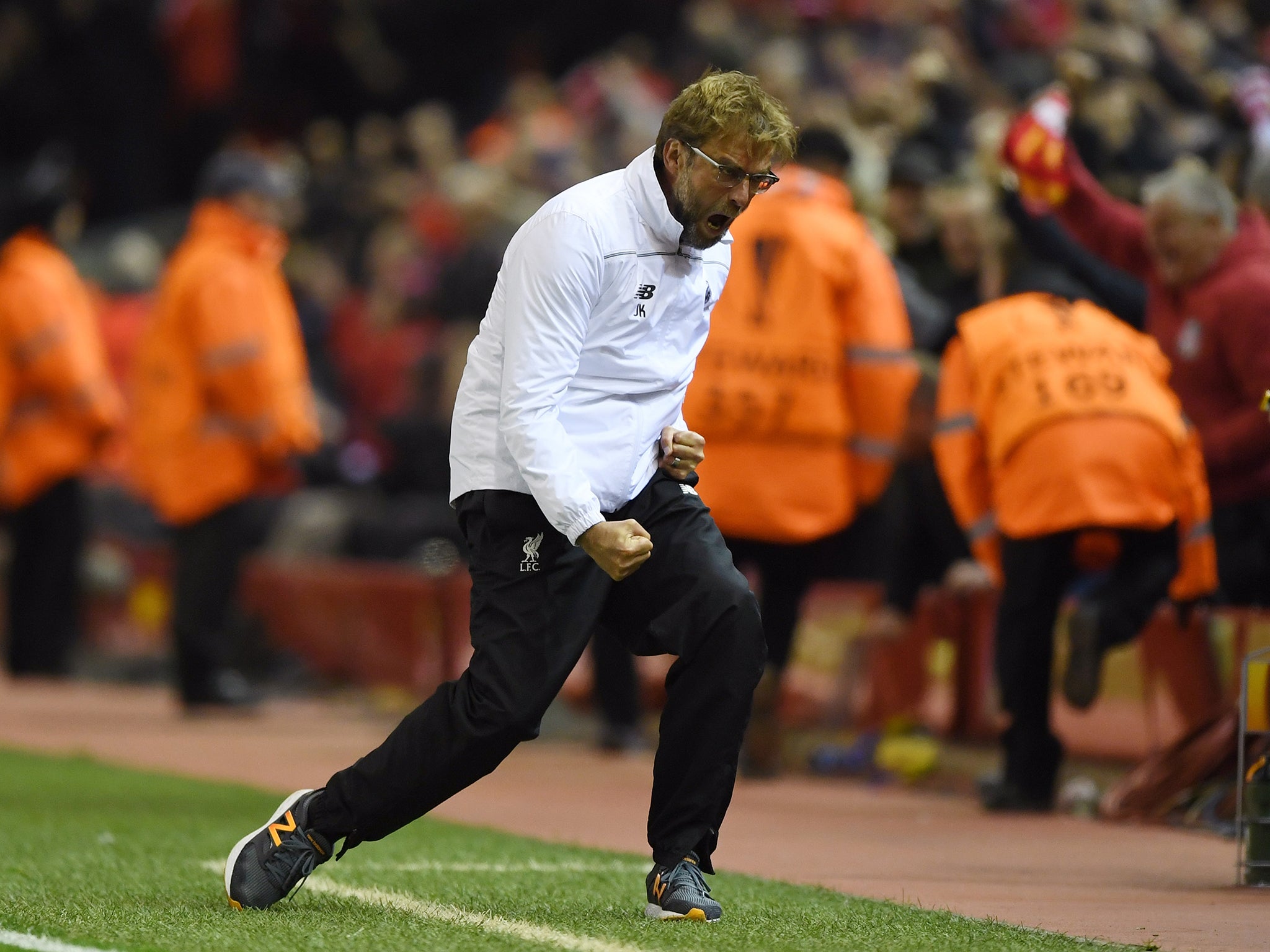Liverpool 4 Borussia Dortmund 3 reaction: Jurgen Klopp proves he can work miracles
Liverpool seemed dead and buried twice in the game

Your support helps us to tell the story
From reproductive rights to climate change to Big Tech, The Independent is on the ground when the story is developing. Whether it's investigating the financials of Elon Musk's pro-Trump PAC or producing our latest documentary, 'The A Word', which shines a light on the American women fighting for reproductive rights, we know how important it is to parse out the facts from the messaging.
At such a critical moment in US history, we need reporters on the ground. Your donation allows us to keep sending journalists to speak to both sides of the story.
The Independent is trusted by Americans across the entire political spectrum. And unlike many other quality news outlets, we choose not to lock Americans out of our reporting and analysis with paywalls. We believe quality journalism should be available to everyone, paid for by those who can afford it.
Your support makes all the difference.The day had started with Borussia Dortmund supporters dressing a Beatles statue on the Mersey waterfront in yellow and black scarves. Having witnessed one of the greatest and most improbable recoveries in its long European history, it ended with ‘Hey Jude’ blasting from Anfield’s public address system and Liverpool reclaiming the famous stadium after it had threatened to be overwhelmed.
“Jürgen! Jürgen! Jürgen!” the Kop repeated as Klopp, the German manager departed the arena like a gladiator exiting the Coliseum following the slaying of a formidable beast.
When Dejan Lovren scored to send Liverpool through with an injury time header, the surprise was not Klopp running down the touchline to join in the celebrations, it was his goalkeeping coach John Achterberg making it all the way to the centre circle with a clip board still in hand. The expression on his face suggested that in the moment, he had lost his mind completely and understandably.
After Inter Milan in 1965, Saint Etienne in 1977 and Olympiacos in 2004, there is now Borussia Dortmund in 2016. Thomas Tuchel, the Dortmund coach, did not need to be asked to compare it to Liverpool’s last European conquest 12 seasons ago in Istanbul. “Milan contributed towards the energy and the belief in the stadium,” he said. “It was the best atmosphere you could have for a football match when the advantage is yours.”
Somehow, Liverpool will play in the semi-finals of the Europa League. They were 2-0 down at half time and 3-1 behind with 25 minutes remaining. As early as the eighth minute, Liverpool appeared to be out after Dortmund seized a two-goal lead in a devastating opening, which sent Anfield spiralling into a condition of inveterate shock.
Tuchel’s side had indicated why Kicker, the well-respected German football magazine, had ordained them curiously as the finest second best team in Bundesliga history. Klopp’s side, meanwhile, revealed why they are only the eighth best team in England and why, indeed, they would probably not be competing in Europe again until the season after next.
Dortmund came at Liverpool with such force, it blew them away. Sometimes, analysis can be basic. Sometimes, one team can simply be better than the other, possessing better players. This was apparently transpiring to be one of those occasions.
Klopp had succeeded last week on his return to Dortmund by working on the hearts and the heads of those who used to work for him, tenderising the Westfalenstadion by appealing to emotions, dragging up the past: suggesting he was better prepared than any manager to face them because of the intimacy he once shared.
Klopp seemed one step ahead of Tuchel at every corner. It proved to be the case; that Dortmund had more to learn about Liverpool than Liverpool did about Dortmund because in the passing of seven days, Tuchel armed himself with a sharper awareness of Liverpool’s weaknesses.
Directly from the kick off, Pierre-Emerick Aubameyang charged towards Emre Can, putting him under pressure, testing his confidence immediately. The Bundesliga’s leading scorer, who was shackled in the first leg, then positioned himself towards the left side of Liverpool’s defence in between Mamadou Sakho and Alberto Moreno. With Henrikh Mkhitaryan also operating in the area, the duel presence was too much and swiftly, Dortmund’s control was absolute.
In the build up, however, Klopp had warned “the crowd is more important to us than the away goal.” Dortmund’s approach, which mixed the smooth, the swashbuckling and the clinical may have initially eliminated that influence. Anfield, indeed, had not witnessed such style from an opponent since Real Madrid turned up in the Champions League and dumped Brendan Rodgers’s team by a 3-0 scoreline when it could have been a lot more embarrassing.
And yet, throughout his career as both a player and a manager, Klopp, has always relished being thrust into the role of underdog. Finding ways of bringing better sides down to the level of the one he represented fascinated him.
He sent Liverpool’s players out earlier than Dortmund’s and clearly, the type of fast start Dortmund had made at the very beginning was not only an instruction but a necessity if Liverpool were going to regain any sort of say over what happened next.
A wonderful second half followed: five goals and four of them to Liverpool. The last did not arrive until the 91st minute but even before then, with Klopp going crazy on the touchline and trying to take throw-ins to push his players forward, there was an overriding sense that progress would somehow end up being Liverpool’s.
At his appointment, Klopp had made it his mission statement to turn Anfield's doubters into believers. After only six months, perhaps he is almost there.
“Something was happening in the stadium,” Klopp confessed. “You could see it. You could feel it. You could smell it.”
Join our commenting forum
Join thought-provoking conversations, follow other Independent readers and see their replies
Comments